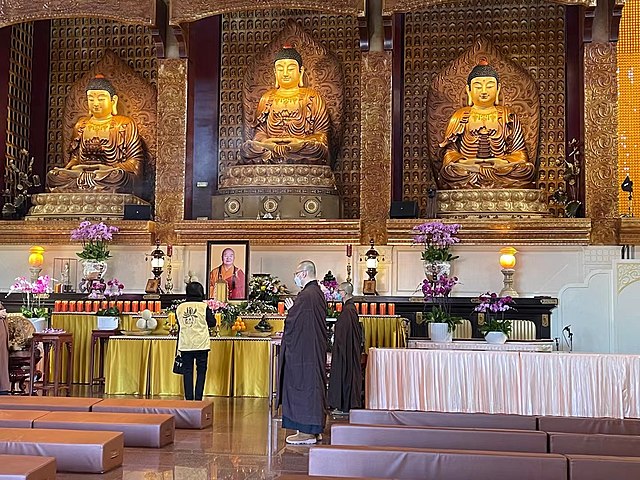Hsing Yun was a Chinese Buddhist monk, teacher, and philanthropist based in Taiwan. He was the founder of the Fo Guang Shan Buddhist monastic order as well as the layperson-based Buddha's Light International Association. Hsing Yun was considered a major proponent of Humanistic Buddhism and one of the most influential teachers of modern Taiwanese Buddhism. In Taiwan, he was popularly referred to as one of the "Four Heavenly Kings" of Taiwanese Buddhism, along with his contemporaries: Master Sheng-yen of Dharma Drum Mountain, Master Cheng Yen of Tzu Chi and Master Wei Chueh of Chung Tai Shan.
Hsing Yun in 2009
Hsing Yun with President Ma Ying-jeou in 2010; Hsing Yun was a supporter of the Kuomintang and gave his endorsement to Ma in the 2008 presidential election.
A memorial altar to Hsing Yun at Hsi Lai Temple following his passing
Fo Guang Shan (FGS) (Chinese: 佛光山; pinyin: Fó guāng shān; lit. 'Buddha's Light Mountain') is an international Chinese Mahāyāna Buddhist organization and monastic order based in Taiwan that practices Humanistic Buddhism whose roots are traced to the Linji school of Chan Buddhism. The headquarters, Fo Guang Shan Monastery, is located in Dashu District, Kaohsiung, and is the largest Buddhist monastery in Taiwan. The organization is also one of the largest charity organizations in Taiwan. The organization's counterpart for laypeople is known as the Buddha's Light International Association.
Fo Guang Shan's Sutra Repository, the home of the Institute of Humanistic Buddhism and library of over 50 editions of Buddhist canons.
Fo Guang Shan Buddha Museum
Buddha statues in the main shrine of Fo Guang Shan
Main entrance to the Fo Guang Shan monastery. Seen also is the BLIA logo, a statue of Maitreya, and the statue of Amitabha in far right.







